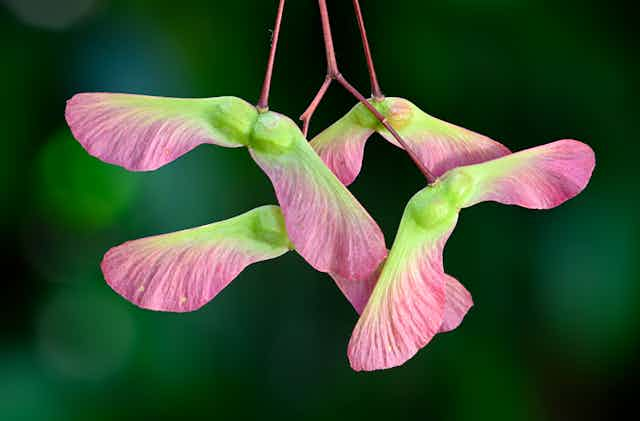Plants need sunlight and carbon dioxide for photosynthesis. What is the other input required for this process?
Water
What is this kind of leaf arrangement called?
Opposite arrangement
Storage, absorption and conduction are 3 functions of roots. What is another function of roots?
Anchoring/stabilization
Gymnosperms are plants that produce _________________.
Cones
Phototropism occurs when a plant grows toward ____________.
Light
Transpiration is the movement of _____ up the trunk of a tree.
Water
This leaf belongs to what kind of tree?

Ginkgo
How deep in the soil are the majority of a tree's roots found?
In the top 12-18 inches
Wind, water, and insects are all methods of pollination. What is another method of pollination?
Mammals (or birds)
What is the xylem responsible for transporting throughout the tree?
Water and minerals
True or false: trees must produce more energy than they use to live.
True
Leaves can either have a simple or ___________ shape.
Compound
Name the part of the root that pushes the root through the soil.
The root cap
Pollination is the process of pollen reaching the ____________________.
Stigma (or more generally, the pistil/female flower part).
The plant hormone ______________ is responsible for fruit ripening.
Ethylene
What is the name of the green chemical compound in leaves that absorbs light for photosynthesis?
Chlorophyll
The most important job of a leaf is to make ______ for the tree.
Food
What resource do roots store?
Carbohydrates/starches
What types of trees produce this kind of seed?

Maple
What layer of the tree is responsible for increasing the tree's diameter each year?
Cambium
Name two parts of a tree where gas exchange occurs.
Stomates, lenticels
(Also roots)
The edge of a leaf is called its _______________.
Margin
Fungi that live around and within the tree roots in a symbiotic relationship with the tree are called _______________.
Myccorhizae
Trees that produce only male or female parts are called ____________.
Dioecious
Heartwood, which is located in the center of the tree, is composed of dead _______.
Xylem